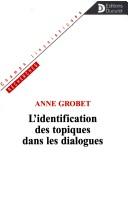| Listing 1 - 4 of 4 |
Sort by
|

ISBN: 9027253420 1588112209 9786612161926 128216192X 9027297460 9789027297464 9781588112200 Year: 2002 Publisher: Amsterdam Philadelphia J. Benjamins
Abstract | Keywords | Export | Availability | Bookmark
 Loading...
Loading...Choose an application
- Reference Manager
- EndNote
- RefWorks (Direct export to RefWorks)
This book explores factors relevant in the choices speakers and writers make in regard to explicitness of reference to the subjects and objects in their utterances. Bulgarian is a particularly felicitous target language for this type of study, since it possesses a rich inventory of available packaging techniques, ranging from zero reference, to various stressed and unstressed single forms, to actual doubled ("reduplicated") constructions. The study systematically addresses the need to avoid referential and grammatical ambiguity, and the crucial influence of emphasis. Another, and perhaps most interesting central factor is the status of what the communication is about, which is assessed on two different levels. The book makes use of data from both published Bulgarian fiction and naturally occurring oral conversations. The fundamental similarities between these modes of communication with respect to noun phrase selection is demonstrated, but explanations are also proposed for the observable differences.
Lexicology. Semantics --- Bulgarian language --- Grammar --- -Bulgarian language --- -Focus (Linguistics) --- Discourse analysis --- Grammar, Comparative and general --- Slavic languages, Southern --- Syntax --- Topic and comment --- Semantics --- LANGUAGE ARTS & DISCIPLINES --- Linguistics / Semantics --- Focus (Linguistics) --- Slavic, Baltic and Albanian Languages & Literatures --- Languages & Literatures --- Syntax. --- Topic and comment. --- Semantics.
Book
ISBN: 8822140532 Year: 2002 Publisher: Firenze Nuova Italia
Abstract | Keywords | Export | Availability | Bookmark
 Loading...
Loading...Choose an application
- Reference Manager
- EndNote
- RefWorks (Direct export to RefWorks)
Discourse analysis --- Grammar, Comparative and general --- Presupposition (Logic) --- #KVHA:Linguistiek; Italiaans --- Language and logic --- Logic --- Functional sentence perspective (Grammar) --- Predicate and subject (Grammar) --- Subject and predicate (Grammar) --- Theme and rheme --- Topic and comment (Grammar) --- Focus (Linguistics) --- Discourse grammar --- Text grammar --- Semantics --- Semiotics --- Topic and comment --- Subject and predicate --- Syntax --- Grammar --- Linguistics --- Philology

ISBN: 9027297371 1282254871 9786612254871 0585462585 9780585462585 9789027297372 9781588112026 1588112020 9789027251176 9027251177 Year: 2002 Publisher: Amsterdam Philadelphia J. Benjamins Pub. Co.
Abstract | Keywords | Export | Availability | Bookmark
 Loading...
Loading...Choose an application
- Reference Manager
- EndNote
- RefWorks (Direct export to RefWorks)
Linguistic Emotivity explores expressive and emotive meanings in Japanese from the perspective of the Place of Negotiation theory. The Place of Negotiation theory provides a framework for understanding how linguistic signs function in the place of communication (in cognitive, emotive, and interactional places). The theory finds the indexicality of a sign fundamental and views meanings as being negotiated among interactants who share not only information but, more significantly, feelings.Using analytical tools recognized in conversation and discourse analyses, the book analyzes emotive topics (vocatives, emotive nominals, quotative topics, etc.) and emotive comments (da and ja-nai, interrogatives, stylistic shifts, etc.) in contemporary Japanese discourse. It argues for the importance of emotivity in Japanese, in the context of the Japanese culture of pathos. Linguistic Emotivity challenges the traditional view of language that privileges logos, form, information, and abstraction, and instead, it proposes a philosophical shift toward pathos, expression, emotion, and linguistic event/action.
Emotive (Linguistics) --- Grammar, Comparative and general --- Japanese language --- Language and culture --- Pathos. --- Functional sentence perspective (Grammar) --- Predicate and subject (Grammar) --- Subject and predicate (Grammar) --- Theme and rheme --- Topic and comment (Grammar) --- Focus (Linguistics) --- Affective meaning (Linguistics) --- Emotive meaning (Linguistics) --- Semantics --- Connotation (Linguistics) --- Emotions --- Suffering --- Sympathy --- Topic and comment. --- Discourse analysis. --- Subject and predicate --- Syntax --- Pathos --- J5200 --- J5280 --- Topic and comment --- Discourse analysis --- Japan: Language -- grammar --- Japan: Language -- grammar -- semantics and rhetoric --- Affective and dynamic functions --- Pragmatics --- Sociolinguistics --- Psycholinguistics --- Emotive (Linguistics). --- Linguistics --- Philology --- Culture

ISBN: 2801113123 9782801113127 Year: 2002 Volume: *20 Publisher: Louvain-la-Neuve : Duculot,
Abstract | Keywords | Export | Availability | Bookmark
 Loading...
Loading...Choose an application
- Reference Manager
- EndNote
- RefWorks (Direct export to RefWorks)
Pragmatics --- Dialogue analysis --- Grammar, Comparative and general --- Topic and comment --- #KVHA:Linguistiek; Frans --- 801.56 --- Syntaxis. Semantiek --- Dialogue analysis. --- Topic and comment. --- 801.56 Syntaxis. Semantiek --- Français (Langue) --- Analyse du discours. --- Topic (taalwetenschap). --- Dialogen. --- Demonstrativpronomen. --- Diskursanalyse. --- Personalpronomen. --- Referenz (Linguistik). --- Segmentierung. --- Français (Langue) - Analyse du discours. --- Französisch. --- Functional sentence perspective (Grammar) --- Predicate and subject (Grammar) --- Subject and predicate (Grammar) --- Theme and rheme --- Topic and comment (Grammar) --- Focus (Linguistics) --- Analysis of dialogue --- DA (Interpersonal communication) --- Interpersonal communication --- Oral communication --- Subject and predicate --- Syntax --- Linguistics --- Philology --- Grammar, Comparative and general - Topic and comment
| Listing 1 - 4 of 4 |
Sort by
|

 Search
Search Feedback
Feedback About UniCat
About UniCat  Help
Help News
News